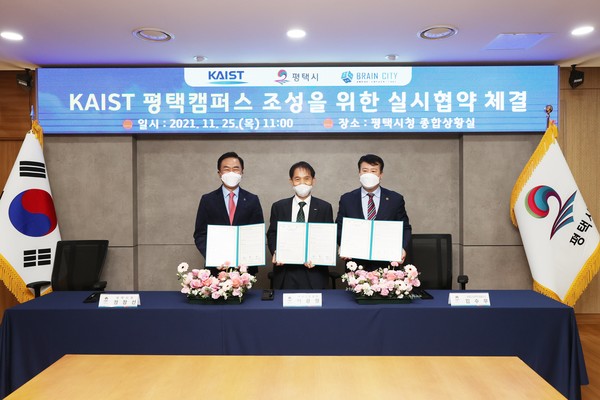On November 25, KAIST announced that a new department for semiconductor engineering would be established in cooperation with Samsung Electronics, along with the construction of a new campus in Pyeongtaek, Gyeonggi-do. Both advancements followed from the Memorandum of Understanding (MOU) between KAIST, Pyeongtaek City, and Samsung Electronics in July which aimed to cultivate human resources and cooperation between industry and academia in the field of semiconductors.

The newly created Semiconductor System Engineering major curriculum will consist of basic and in-depth semiconductor system courses, humanities and social science education, and practical experience. Field trips, internship opportunities, and joint workshops with Samsung Electronics will be available for students to allow students to have diverse experiences and foster pragmatic adaptability. Furthermore, KAIST plans to conduct novel types of classes that combine lectures, experiments, and two-way discussions based on the research capabilities of mentors at Samsung Electronics as well as KAIST faculty. The new department will be launched beginning the 2022 Spring semester. For the first two years, approximately 50 undergraduate students from the School of Freshman will be able to enter the department after their first year, when they declare their majors. From 2023 to 2026, students will be required to apply directly for the Semiconductor System Engineering major for admission — the department plans to admit 100 freshmen each year. Special scholarships will be provided to all students in the department.
The department will be employment contract-based, where students would be required to work at Samsung Electronics upon graduation. Some critics express concerns that the new department unnecessarily limits the future career paths of students: the opportunity to explore major options as an undeclared freshman is lost after 2023, and job opportunities at other companies are restricted as compared to simply graduating from the School of Electrical Engineering. Nevertheless, the career guarantee and support from the university also offer merit to those students deciding to take this route.
Meanwhile, the implementation agreement signed by President Lee, Pyeongtaek city mayor Jang-Seon Jeong, and CEO Su Woo Kim of Brain City Project Financing Vehicle (Brain City PFV) confirmed the construction of a KAIST campus in Pyeongtaek. The new campus will be built as part of “Brain City”, an industrial complex currently under development in Doil-dong, Pyeongtaek. Brain City seeks to combine universities, commerce, medical facilities, and housing and provide infrastructure for future technological industry development. Approximately 460,000 m2 of land was allocated for the new KAIST campus. A three-phase establishment scheme is planned: from 2022 to 2026, the construction of the Pyeongtaek campus is to be completed with over 100 billion KRW in subsidies; from 2027 to 2031, a semiconductor research center will be established as a platform for future technology convergence research; from 2031 to 2036, the project aims to build a cluster hub for next-generation semiconductor, bio-, cities, and automobile technologies. The new campus will provide advanced research facilities for students and promote joint research between the university and companies. In addition, programs relating to technical support, start-up support, and gifted students’ education will also operate to contribute to the local community.
The recent agreements highlighted the importance placed on the semiconductor industry in Korea and the involvement of KAIST in achieving these goals. “As semiconductor technology is the core foundation of the Fourth Industrial Revolution era, continuously building capability is essential,” President Lee noted. “KAIST will train key personnel to lead Korea towards becoming the world’s top semiconductor powerhouse.” It is expected that the agreements will assist students interested in semiconductor technology and researchers to build upon their interests and collaborate with the industry.

